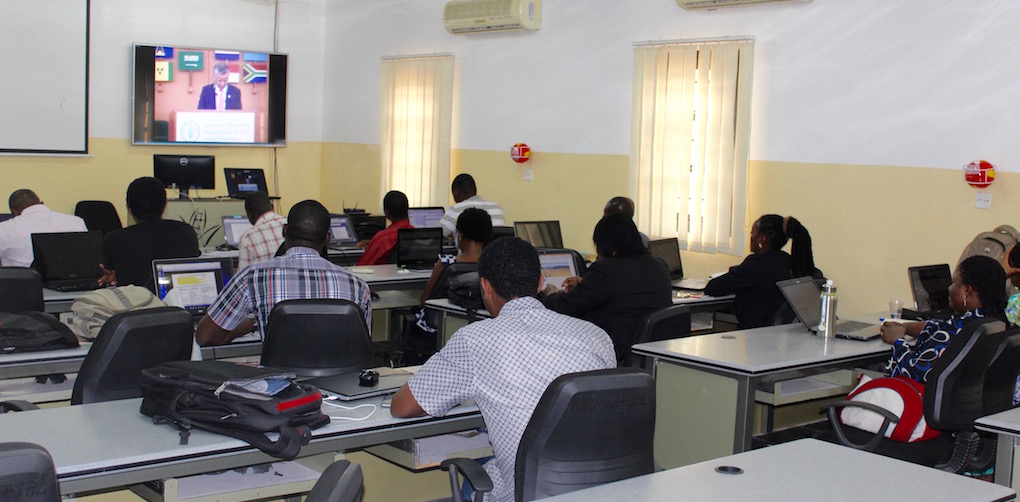
WACCI Students participating via skype
Students of the West Africa Centre for Crop Improvement (WACCI) have participated in an international symposium organized by The Food and Agriculture Organization (FAO) of the United Nations from February 15-17, 2016 in Rome. The theme of the symposium was “The role of agricultural biotechnologies in sustainable food systems and nutrition”.
The aim of the symposium was to examine how the application of science and technology, and particularly agricultural biotechnologies, can assist smallholders in developing sustainable food systems and improving nutrition. The symposium sought to inform policy makers of member countries on the rapid scientific and technical advances and tools, as well as the associated risks and benefits taking into account environmental, social and economic dimensions, data management and sharing mechanisms.
The symposium was in three sections; a plenary section, a high level ministerial segment and a student session. Students from WACCI participated in the plenary and student sessions via videoconferencing. The plenary section was opened on February 15, 2016 with a welcome address by Jose Graziano da Silva, Director General of FAO, Rome, Italy. Keynote addresses were also delivered by Louise Fresco, President, Executive Board of Wageningen UR, the Netherlands, Distinguished Professor Gebisa Ejeta, Purdue University, USA, Mr. Mauricio Lopes, President, Empresa Brasileira de Pesquisa Agropecuaria, Brazil and Gunter Pauli, Founder, Zero Emissions Research and Initiatives Network, Japan.
The Student Interactive Session was held on February 16, 2016 at 17:30-19:00, Rome Time, to allow greater engagement of agricultural students in universities and young agricultural professionals around the world who were not able to participate in the Symposium in Rome to also make meaningful contributions to the Symposium. This event was to help bring forward the perspectives and opinions of such students to the attention of the policy and decision makers worldwide. It was to allow the symposium to hear about the key issues that are important for the next generation scientists, agricultural practitioners, leaders and decision makers. Six universities; University of Ghana (WACCI), Ghana, American University of Beirut, Lebanon, Bogor Agriculture University, Indonesia, Cornell University, USA, Wageningen University, The Netherlands and Universidad Nacional de Colombia, Colombia were connected via video-link with FAO HQ through multiple screens. The facilitator gave an overview and invited the student representatives to provide their suggestions and inputs for policy makers of the FAO member countries. The student representatives from WACCI; Mr. Kwabena Bediako Asare and Miss Juliana Mariama Vangahun and those from the other invited universities prepared a concise paper based on the issues from the plenary session and the high level ministerial segment. The input of the students focused mainly on specific suggestions for policy makers on the current challenges and opportunities and the role of policy makers of the future in the area of agriculture biotechnology. Some issues raised by the students of WACCI were: how to deal with the poor adoption of Genetically Modified Organisms (GMOs) in Africa, the policies governing the introduction and use of genetically modified products in Africa and the opportunities which exist for the youth in Africa as the next generation policy makers. The key messages from the Student sessions were documented and reported in the final plenary session.
The symposium equipped students with new knowledge and allowed them to contribute in discussions which will inform policies in the application of biotechnology for sustainable development of agriculture.
